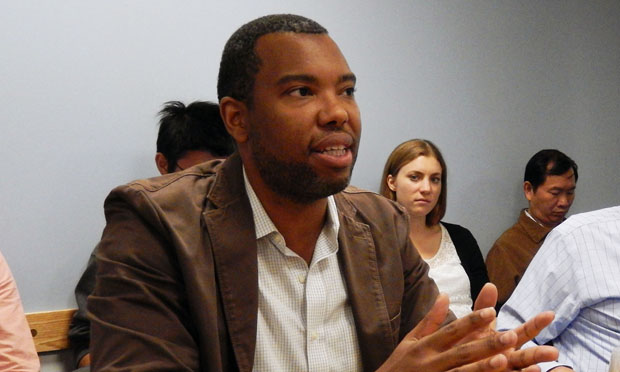The Harvard Kennedy School’s Shorenstein Center hosts a weekly speaker series throughout the academic year. The events feature a wide variety of journalists and media thinkers — from Bart Gellman, Maggie Haberman and Ta-Nehisi Coates to Ethan Zuckerman, Chuck Todd and Joan Walsh. As the fall 2013 semester comes to a close, we’ve rounded up discussions of interest for journalists and media members of all kinds. Topics of conversation range from politics and digital-media dynamics to issues of race in America.
A full list of past Shorenstein Center events can be found in our calendar archive. You can also subscribe to our iTunes feed to hear these and future conversations. The following are a half-dozen highlights from this fall’s discussions:
______
Washington Post’s Barton Gellman: Covering national security and the Snowden case.
As one of only three people with direct contact to Edward Snowden, Gellman, a Pulitzer Prize-winning journalist, shared with the Shorenstein Center how the Snowden leaks about the NSA have affected the U.S. government, marketplace and democracy.
[soundcloud url=”https://api.soundcloud.com/tracks/115603180″ width=”100%” height=”166″ iframe=”true” /]
______
Maggie Haberman of Politico: 2013 elections hold little “predictive value.”
Reflecting on the 2013 elections and what they might mean for 2014 and 2016, Haberman, senior political reporter for Politico, shared with the Shorenstein Center what she saw as the three key outcomes that might shed light on future political developments.
[soundcloud url=”https://api.soundcloud.com/tracks/120940523″ width=”100%” height=”166″ iframe=”true” /]
______
MIT’s Ethan Zuckerman: Cognitive diversity is essential in breaking out of the box of social media.
How can we increase our cognitive diversity through social networks that thrive on familiarity? To look more closely at answers and possible solutions, the Shorenstein Center invited Zuckerman, director of the Center for Civic Media at MIT and principal research scientist at the MIT Media Lab, to share his insights.
[soundcloud url=”https://api.soundcloud.com/tracks/117653407″ width=”100%” height=”166″ iframe=”true” /]
______
The Atlantic’s Ta-Nehisi Coates: A history of systemic racism that has led to today’s dual society.
Coates, a senior editor, writer and blogger for The Atlantic, shared with the Shorenstein Center his thoughts on the dual society in America — its historical sources, impact on public policy, and what implications it might have on the country’s future.
[soundcloud url=”https://api.soundcloud.com/tracks/114440319″ width=”100%” height=”166″ iframe=”true” /]
______
Chuck Todd of NBC News: The inside scoop on media and politics in Washington, D.C.
Todd, the NBC News chief White House correspondent and political director, gives a broad tour of how politics and the news media are evolving in the nation’s capitol.
[soundcloud url=”https://api.soundcloud.com/tracks/109887155″ width=”100%” height=”166″ iframe=”true” /]
______
Salon’s Joan Walsh: A way to eliminate racial and political polarization.
Walsh, editor-at-large of Salon.com and a political analyst for MSNBC, spoke to the Shorenstein Center about racial change and political polarization.
[soundcloud url=”https://api.soundcloud.com/tracks/111082063″ width=”100%” height=”166″ iframe=”true” /]


Expert Commentary